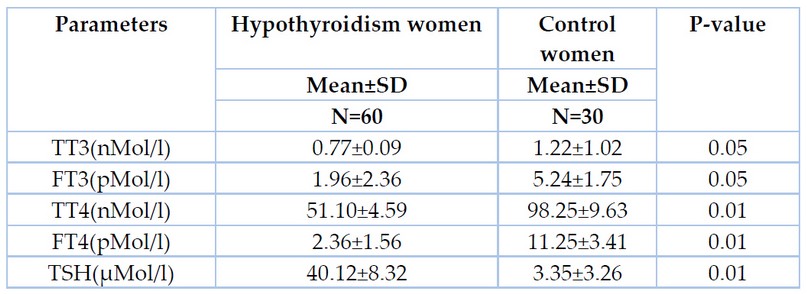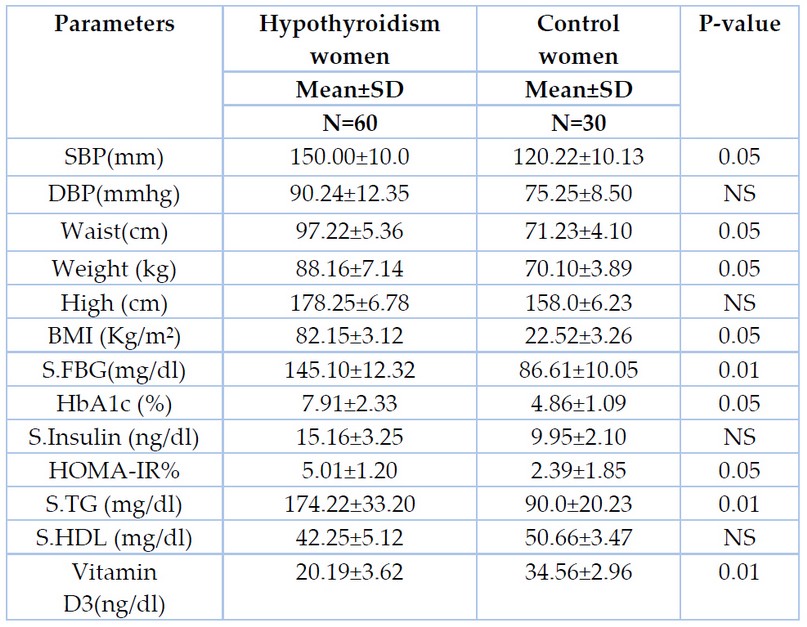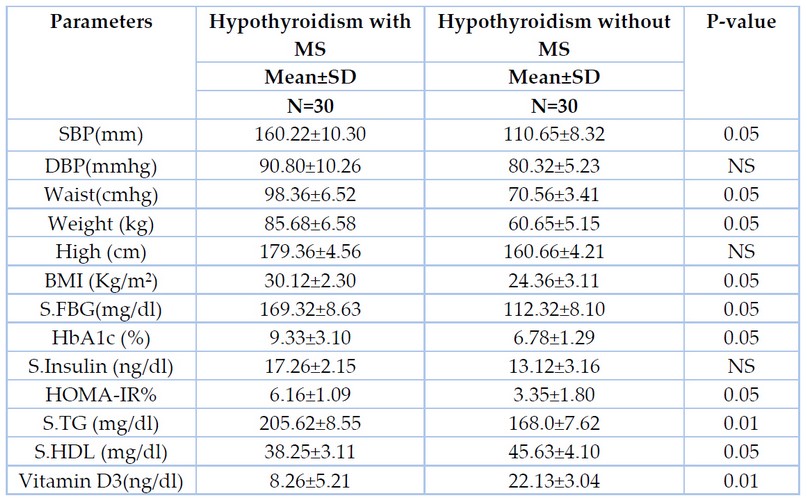2023.08.01.89
Files > Volume 8 > Vol 8 No 1 2023
1,2,3 National Diabetes center/ Mustansiriyah University, Baghdad, Iraq.
4 collage of Medicne. Mustansiriyah University, Baghdad, Iraq.
Available from: http://dx.doi.org/10.21931/RB/2023.08.01.89
ABSTRACT
This study was designed to evaluate vitamin D3 and metabolic hormones in hypothyroidism with metabolic syndrome and hypothyroidism without metabolic syndrome. Sixty patients with hypothyroidism were divided into three groups, 30 with hypothyroidism with metabolic syndrome, 30 with hypothyroidism without metabolic syndrome, and 30 with healthy controls compared with the patients. There was a significant increase in tetraiodothyronine, free thyronine and a very significant increase in thyroid stimulating hormone in women with hypothyroidism with metabolic syndrome compared to women with hypothyroidism without metabolic syndrome. A significant increase in systolic blood pressure, body mass index, fasting blood glucose, glycosylated hemoglobin, insulin resistance, high-density lipoproteins, triglycerides and vitamin D3 in women with hypothyroidism with metabolic syndrome compared to women with hypothyroidism without metabolic syndrome. It can be concluded that a deficiency in the vitamin D level in the body negatively affects the various functions of the immune system, which increases the likelihood of developing severe immune diseases attacking the thyroid gland in diabetic women with metabolic syndrome.
Keywords: Hypothyroidism, Metabolic Syndrome, Vitamin D3, Insulin Resistance
INTRODUCTION
The thyroid organ may be a part of the body's endocrine system. It is the largest organ in the human body that performs endocrine functions. It might be shaped organ in the shape of a butterfly. It's a vein-rich organ that wraps around the front of the throat and closes the vocal cords. In infancy and childhood, the organ is essential for average body growth. It stores iodine from food and releases thyroid hormones, which are iodine-containing substances that help regulate the digestive system's rate. It comes in various shapes and sizes and helps regulate body temperature 1.
Euthyroidism is characterized by ordinary thyroid hormone generation and serum levels2,3
Hypothyroidism is a condition in which the thyroid gland does not operate properly. It can manifest as an overt myxedema, end-organ repercussions, multisystem failure, or a subclinical illness with normal thyroxine and triiodothyronine levels. Hypothyroidism was observed in 4%–5% of the population in developed countries, while it altered in the Indian population at the same time 4
Hyperthyroidism is a medical condition in which the thyroid gland produces and secretes too much thyroid hormone. Thyroid radioactive iodine uptake is normal or excessive in this condition. Low serum thyroid-stimulating hormone (TSH) concentrations characterize hyperthyroidism, which can be overt or subclinical 5
Vitamin D, a steroid hormone defined as 25-hydroxyvitamin D3, plays a central role in the metabolism of calcium, phosphorus and bone mineralization 6. (The decreased vitamin D3 value may play a significant role in the pathogenesis of metabolic syndrome. In general high prevalence rate of hypovitaminosis is observed in both patients and control groups in the Iraqi population Mackawy et al. There was also an inverse relationship between VitD levels and TSH values, with an increased frequency of hypovitaminosis D and hypocalcemia in hypothyroid patients 7
This study was designed to study evaluate vitamin D3 and metabolic hormones in hypothyroidism with metabolic syndrome and hypothyroidism without metabolic syndrome.
MATERIALS AND METHODS
Sixty hypothyroidism patients were divided into two groups (30 Hypothyroidism with metabolic syndrome ( MS ) and 30 Hypothyroidism without metabolic syndrome ( MS) and thirteen healthy control compared patients.
The study was approved by the National Diabetes Center at Mustansiriyah University in Baghdad- Iraq. The data were collected from patients aged 34 - 65 on April 1, 2019, and December 30, 2020. Data about age, weight, high, BMI, waist SBP and DBP were collected. The levels of FBG, Triacylglycerol and HDL were measured by using an automated analyzer Kenza 240 TX. HbA1c % was measured by using (Bio-Rad) (VARIANT). HOMA-IR is calculated using software downloaded freely (http://www. dtu.ox.ac.uk/HOMA.calculater/download.php). Insulin was determined by ELISA Kits using DRG company. The levels of vitamin D3 and Thyroid hormones (TT3, TT4, and TSH) were determined via minivans kits supplied by Bio Meriux-France.
RESULTS AND DISCUSSION
There was a significant increase in TT3& FT3, while a highly significant increase in TT4, FT4, and TSH in hypothyroidism compared with the control group, as seen in table 1.

Table 1. Effect of metabolic hormones between hypothyroidism women and control women.
There was a significant increase in SBP, Waist, Weight, BMI, HbA1c and HOMA-IR, while a highly significant increase in FBG, TG and Vitamin D3 in hypothyroidism women when compared with the control group, as seen in table 2.

Table 2. Clinical parameters between hypothyroidism women and control women.
As shown in table 3 a significant increase in TT4, FT4 and a highly significant increase in TSH in hypothyroidism women with metabolic syndrome when compared to hypothyroidism women without metabolic syndrome

Table 3. Effect of metabolic hormones between hypothyroidism with metabolic syndrome and hypothyroidism without metabolic syndrome.
A significant increase in SBP, Waist, Weight, BMI, FBS, HbA1c, HOMA-IR and HDL, while a highly significant increase in TG and Vitamin D3 in hypothyroidism women with metabolic syndrome when compared to hypothyroidism women without metabolic syndrome as seen as in table 4.

Table 4. Clinical parameters between hypothyroidism with metabolic syndrome and hypothyroidism without metabolic syndrome.
DISCUSSION
A previous study suggested that The TSH level was above the normal population's reference range, and metabolic syndrome patients had considerably higher TSH levels than controls. 8 Thyroid hormones impact lipid metabolism and hence metabolic syndrome components, with a positive relationship between TSH and LDL cholesterol and a negative relationship between TSH and HDL cholesterol9. Because vitamin D receptors may be found in almost every tissue and cell in the human body, vitamin D is regarded as an entirely distinct hormone. Multiple studies have linked low serum levels of vitamin D to hypothyroidism. There are two possible explanations for why serum vitamin D levels are low in hypothyroid patients: one is that low vitamin D levels are related to poor absorption of vitamin D from the gut. The other is that these patients' bodies do not respond well to vitamin D 10. The role of vitamin D in thyroid disease has been suggested by pioneering studies conducted in the 1980s. McDonnell et al. revealed a strong resemblance between the molecular structure of the vitamin D3 receptor and the thyroid hormone receptor 11
Talaei et al., 2020 suggested there is a significant positive link between serum levels of vitamin D with thyroid hormones and an important negative link with TSH levels and indicated that the deficiency of serum levels of vitamin D is a significant correlation with the degree and severity of hypothyroidism. Some clinical parameters, such as HbA1c was, elevated and important in the study group 9.3 % compared with the control group 6.76% in hypothyroidism, agreed with Jain et al. 12 The TSH level was above the reference range for the average population. They also observed significantly higher TSH levels in metabolic syndrome patients and agreed with a previous study in a metabolic syndrome that achieved a P-value <0.05 8,13. Many parameters of metabolic syndrome were observed elevated, such as triglycerides 205.62 mg/dl in the hypothyroidism group compared with control group 168; this level is closely linked with subclinical hypothyroidism, agreeing with Chang et al. 14 Healthy thyroid activity is required to maintain the overall health of an individual. Several previous studies mention the effect of thyroid hormones on body mass index (BMI) 15. Hypothyroidism induces weight gain, while hyperthyroidism leads to weight loss. Moreover, it has also been confirmed that obesity affects thyroid gland function 16
CONCLUSIONS
It can be concluded that a deficiency in the level of vitamin D in the body because a deficiency of vitamin D negatively affects the various functions of the immune system in the body, which increases the likelihood of developing severe immune diseases that attack the thyroid gland disorder in diabetic women with metabolic syndrome.
REFERENCES
1. Jawad, A, H., Alsayed, R., Ibrahim, A, E., Hallab, Z., Al-Qaisi, Z., &Yousif, E. Thyroid Gland and Its Rule in Human Body. Research Journal of Pharmaceutical, Biological and Chemical Sciences, 2016, 7(6), 1336.
2. Huang, B., Yang, S., & Ye, S. (2020). Association between Thyroid Function and Nonalcoholic Fatty Liver Disease in Euthyroid Type 2 Diabetes Patients. Journal of Diabetes Research, 2020.
3. Nie, X., Shen, Y., Ma, X., Xu, Y., Wang, Y., Zhou, J., & Bao, Y. (2020). Associations Between Thyroid Hormones and Glycated Albumin in Euthyroid and Subclinical Hypothyroid Individuals: Results of an Observational Study. Diabetes, metabolic syndrome and obesity: targets and therapy, 13, 915.
4. Talwalkar, P., Deshmukh, V., & Bhole, M. (2019). Prevalence of hypothyroidism in patients with type 2 diabetes mellitus and hypertension in India: a cross-sectional observational study. Diabetes, metabolic syndrome and obesity: targets and therapy, 12, 369.
5. De Leo, S., Pearce, E. N., & Braverman, L. E. (2017). Iodine supplementation in women during preconception, pregnancy, and lactation: current clinical practice by US obstetricians and midwives. Thyroid, 27(3), 434-439.
6. Jassam, N., Visser, T. J., Brisco, T., Bathia, D., McClean, P., & Barth, J. H. (2011). Consumptive hypothyroidism: a case report and review of the literature. Annals of clinical biochemistry, 48(2), 186-189.
7. Vieira, I. H., Rodrigues, D., & Paiva, I. (2020). Vitamin D and Autoimmune Thyroid Disease—Cause, Consequence, or a Vicious Cycle?. Nutrients, 12(9), 2791.
8. Abedalhammed, H. S., Naser, A. S., Al-Maathedy, M. H., Mohammed, Th. T., Jaber, B. T. & Al-Asha'ab, M. H. The effect of vitamin e as an antioxidant with different levels of dried tomato pomace supplementation on diets of common carp (cyprinus carpio l) on blood indices. Biochemical and Cellular Archives. 2020, 20(2): 5173-5176. .
9. Kc, R., Khatiwada, S., Deo Mehta, K., Pandey, P., Lamsal, M., & Majhi, S. (2015). Cardiovascular risk factors in subclinical hypothyroidism: a case control study in Nepalese population. Journal of thyroid research, 2015.
10. Talaei, A., Ghorbani, F., & Asemi, Z. (2018). The effects of Vitamin D supplementation on thyroid function in hypothyroid patients: A randomized, double-blind, placebo-controlled trial. Indian journal of endocrinology and metabolism, 22(5), 584.
11. Muscogiuri, G., Tirabassi, G., Bizzaro, G., Orio, F., Paschou, S. A., Vryonidou, A., ... & Colao, A. (2015). Vitamin D and thyroid disease: to D or not to Do?. European journal of clinical nutrition, 69(3), 291-296.
12. Jain, P., Hawale, M. D. V., GangaramLaxmanBhadarge, M., Jain, P., Shegaonkar, V., & Jain, P. To Assess Hba1c In Non Diabetic Subclinical Hypothyroidism Patients. European Journal of Molecular & Clinical Medicine, 2021, 8(1), 308-313.
13. Binobead, M. A., Al Badr, N. A., Al-Qahtani, W. H., AlSedairy, S. A., Albrahim, T. I., Alhussain, M. H., ... & Al-Qahtani, W. S. (2019). Thyroid hormone levels associate with insulin resistance in obese women with metabolic syndrome in Saudi Arabia: A cross-sectional study. bioRxiv, 595884.
14. Chang, C. H., Yeh, Y. C., Caffrey, J. L., Shih, S. R., Chuang, L. M., & Tu, Y. K. Metabolic syndrome is associated with an increased incidence of subclinical hypothyroidism–A Cohort Study. Scientific reports, 2017, 7(1), 1-8.
15. Xu, R., Huang, F., Zhang, S., Lv, Y., & Liu, Q. (2019). Thyroid function, body mass index, and metabolic risk markers in euthyroid adults: a cohort study. BMC endocrine disorders, 19(1), 1-9.
16. Topsakal, S., Yerlikaya, E., Akin, F., Kaptanoglu, B., & Erürker, T. Relation with HOMA-IR and thyroid hormones in obese Turkish women with metabolic syndrome. Eating and Weight Disorders-Studies on Anorexia, Bulimia and Obesity, 2012, 17(1), e57-e61.
17. Alkubaisy,S.A., A.A. Majid, S.M. Abdulateef, F.A. Al-Bazy, O.K. Attallah, O.M. Abdualmajeed, Th. T. Mohammed, F.M. Abdulateef, K.I. Mahmud. Effects of In-Ovo injection of Biotin on chick's embryonic development and physiological traits. IOP Conference Series: Earth and Environmental Science.2021, 761(1), 012111
Received: January 15, 2023 / Accepted: February 25, 2023 / Published:15 March 2023
Citation. Bohan, A.H.; Tahir, N.T.; Hashim, R.K. Bohan, H.H. Evaluation of Vitamin D3 in Thyroid Disorder Iraqi Women (Hypothyroidism with and without Metabolic Syndrome). Revis Bionatura 2023;8 (1) 89 http://dx.doi.org/10.21931/RB/2023.08.01.89
